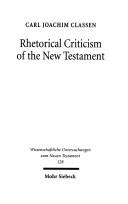| Listing 1 - 6 of 6 |
Sort by
|
Book
ISBN: 3818502986 Year: 2000 Publisher: Marburg Universitatsbibliothek
Abstract | Keywords | Export | Availability | Bookmark
 Loading...
Loading...Choose an application
- Reference Manager
- EndNote
- RefWorks (Direct export to RefWorks)
Book
ISBN: 3799548068 9783799548069 Year: 2000 Publisher: Stuttgart Jan Thorbecke
Abstract | Keywords | Export | Availability | Bookmark
 Loading...
Loading...Choose an application
- Reference Manager
- EndNote
- RefWorks (Direct export to RefWorks)
Book
ISBN: 8870163628 Year: 2000 Publisher: Torino Claudiana
Abstract | Keywords | Export | Availability | Bookmark
 Loading...
Loading...Choose an application
- Reference Manager
- EndNote
- RefWorks (Direct export to RefWorks)
Book
ISSN: 01713469 ISBN: 3402038080 9783402038086 Year: 2000 Volume: 144 Publisher: Münster Aschendorff
Abstract | Keywords | Export | Availability | Bookmark
 Loading...
Loading...Choose an application
- Reference Manager
- EndNote
- RefWorks (Direct export to RefWorks)
2 MELANCHTHON, PHILIPP --- 2 CALVIN, JEAN --- 873.4 ERASMUS ROTERODAMUS, DESIDERIUS --- Godsdienst. Theologie--MELANCHTHON, PHILIPP --- Godsdienst. Theologie--CALVIN, JEAN --- Humanistisch Latijnse literatuur--ERASMUS ROTERODAMUS, DESIDERIUS --- 873.4 ERASMUS ROTERODAMUS, DESIDERIUS Humanistisch Latijnse literatuur--ERASMUS ROTERODAMUS, DESIDERIUS --- 2 CALVIN, JEAN Godsdienst. Theologie--CALVIN, JEAN --- 2 MELANCHTHON, PHILIPP Godsdienst. Theologie--MELANCHTHON, PHILIPP

ISBN: 3161473701 9783161473708 Year: 2000 Volume: 128 Publisher: Tübingen Mohr Siebeck
Abstract | Keywords | Export | Availability | Bookmark
 Loading...
Loading...Choose an application
- Reference Manager
- EndNote
- RefWorks (Direct export to RefWorks)
Rhetoric in the Bible. --- 225.015 --- Rhetoric in the Bible --- Nieuw Testament: literaire kritiek; authenticiteit; bronnenstudie --- Melanchthon, Philipp --- 225.015 Nieuw Testament: Formgeschichte; Traditionsgeschichte; Redaktionsgeschichte --- 225.015 Nieuw Testament: literaire kritiek; authenticiteit; bronnenstudie --- Nieuw Testament: Formgeschichte; Traditionsgeschichte; Redaktionsgeschichte --- Neues Testament --- Rhetorik --- Rhetorik. --- Neues Testament. --- Paulus, --- Melanchthon --- Melanchthon, Philipp, --- Exegese --- Rhetorische Analyse --- Melanchton, Philipp --- Melantton, Philippus --- Melanchthon, Philippus --- Bible. --- Ba-yon Tipan --- Bagong Tipan --- Jaji ma Hungi --- Kainē Diathēkē --- New Testament --- Nouveau Testament --- Novo Testamento --- Novum Testamentum --- Novyĭ Zavet --- Novyĭ Zavi︠e︡t Gospoda nashego Īisusa Khrista --- Novyĭ Zavit --- Nuevo Testamento --- Nuovo Testamento --- Nye Testamente --- Perjanjian Baru --- Dhamma sacʻ kyamʻʺ --- Injīl --- Criticism, interpretation, etc. --- Language, style. --- Melancthon, --- Schwartzerd, Philipp, --- Schwartzerdt, Philipp, --- Didymus Faventinus, --- Faventinus, Didymus, --- Melantone, Filippo, --- Melanthon, Philippus, --- Melancton, Philip, --- Melancthon, Philip, --- Melanchton, Philippus, --- Melancthon, Philippe, --- Melankhton, Filipp,
Book
ISBN: 0691223947 Year: 2000 Publisher: Princeton : Princeton Univ. Press,
Abstract | Keywords | Export | Availability | Bookmark
 Loading...
Loading...Choose an application
- Reference Manager
- EndNote
- RefWorks (Direct export to RefWorks)
Adam, Prometheus, and Faust--their stories were central to the formation of Western consciousness and continue to be timely cautionary tales in an age driven by information and technology. Here Theodore Ziolkowski explores how each myth represents a response on the part of ancient Hebrew, ancient Greek, and sixteenth-century Christian culture to the problem of knowledge, particularly humankind's powerful, perennial, and sometimes unethical desire for it. This book exposes for the first time the similarities underlying these myths as well as their origins in earlier trickster legends, and considers when and why they emerged in their respective societies. It then examines the variations through which the themes have been adapted by modern writers to express their own awareness of the sin of knowledge. Each myth is shown to capture the anxiety of a society when faced with new knowledge that challenges traditional values. Ziolkowski's examples of recent appropriations of the myths are especially provocative. From Voltaire to the present, the Fall of Adam has provided an image for the emergence from childhood innocence into the consciousness of maturity. Prometheus, as the challenger of authority and the initiator of technological evil, yielded an ambivalent model for the socialist imagination of the German Democratic Republic. And finally, an America unsettled by its responsibility for the atomic bomb, and worrying that in its postwar prosperity it had betrayed its values, recognized in Faust the disturbing image of its soul.
Mythology in literature. --- Faust, --- Adam --- In literature. --- Adapa. --- Aeschylus. --- Anacreon. --- Anaxagoras. --- Apollodorus. --- Beethoven, Ludwig van. --- Berman, Marshall. --- Borrow, Anthony. --- Camerarius, Joachim. --- Cleisthenes. --- Dali, Salvador. --- Damn Yankees. --- Dickens, Charles. --- Don Juan. --- Dyson, Freeman. --- Edwards, Jonathan. --- Erasmus, Desiderius. --- Greene, Graham. --- Hamlet. --- Heine, Heinrich. --- Herodotus. --- Herseyjohn. --- Hesiod. --- Institoris, Heinrich. --- Jerome, Saint. --- Jerusalem. --- Jonson, Ben. --- Keim, Andrew. --- Kirsch, Rainer. --- Klinger, Max. --- Kreitzer, Larry. --- Kupelwieser, Leopold. --- Legenda Aurea. --- Mailer, Norman. --- Mainzer, Otto. --- Malleus Maleficorum. --- Melanchthon, Philipp. --- Napoleon. --- Nono, Luigi. --- Olson, Elder. --- Orff, Carl. --- Paul, Saint. --- Peisistratus. --- Poussin, Nicholas. --- Prometheia. --- Quinet, Edgar. --- biblical criticism. --- chapbook. --- curiositas. --- etiology. --- forbidden knowledge. --- pact with devil.
| Listing 1 - 6 of 6 |
Sort by
|

 Search
Search Feedback
Feedback About UniCat
About UniCat  Help
Help News
News